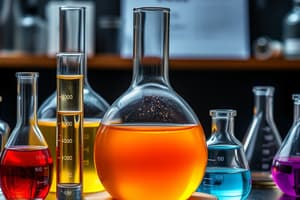Podcast
Questions and Answers
Which of the following is NOT a key element of the scientific method?
Which of the following is NOT a key element of the scientific method?
- Observation
- Hypothesis
- Intuition (correct)
- Data analysis
What is the primary purpose of an experiment in the scientific method?
What is the primary purpose of an experiment in the scientific method?
- To prove a hypothesis is correct
- To gather data for a report
- To confirm existing knowledge
- To test a hypothesis (correct)
Which statement BEST describes the relationship between a hypothesis and a theory in science?
Which statement BEST describes the relationship between a hypothesis and a theory in science?
- A theory is a more comprehensive explanation than a hypothesis (correct)
- A theory is a confirmed hypothesis
- A hypothesis is a more specific prediction than a theory
- A hypothesis is a proven theory
What is the main characteristic that distinguishes a scientific theory from a mere guess?
What is the main characteristic that distinguishes a scientific theory from a mere guess?
Which of the following is NOT a characteristic of scientific knowledge?
Which of the following is NOT a characteristic of scientific knowledge?
The statement "The Earth revolves around the Sun" is best described as a...
The statement "The Earth revolves around the Sun" is best described as a...
How does the scientific method ensure progress in understanding the natural world?
How does the scientific method ensure progress in understanding the natural world?
Which statement BEST describes the nature of science?
Which statement BEST describes the nature of science?
Which of the following is a characteristic of a scientific law?
Which of the following is a characteristic of a scientific law?
Which of the following is an example of a scientific law?
Which of the following is an example of a scientific law?
What is the importance of precise measurement in scientific investigation?
What is the importance of precise measurement in scientific investigation?
What is the role of significant figures in scientific measurement?
What is the role of significant figures in scientific measurement?
Flashcards
Scientific Knowledge
Scientific Knowledge
Knowledge based on reasoning, evidence, and experiments, not beliefs.
Scientific Law
Scientific Law
A statement that describes a consistent relationship in nature, usually expressed mathematically.
Examples of Scientific Laws
Examples of Scientific Laws
Famous laws include the Law of Gravity and the Law of Conservation of Energy.
Scientific Measurement
Scientific Measurement
Signup and view all the flashcards
Significant Figures
Significant Figures
Signup and view all the flashcards
Scientific Method
Scientific Method
Signup and view all the flashcards
Observation
Observation
Signup and view all the flashcards
Hypothesis
Hypothesis
Signup and view all the flashcards
Experiment
Experiment
Signup and view all the flashcards
Scientific Theory
Scientific Theory
Signup and view all the flashcards
Revision of Theories
Revision of Theories
Signup and view all the flashcards
Empirical Evidence
Empirical Evidence
Signup and view all the flashcards
Objectivity in Science
Objectivity in Science
Signup and view all the flashcards
Study Notes
The Scientific Method
- Science is a systematic way of acquiring knowledge about the natural world through observation, experimentation, and the formulation of testable hypotheses.
- The scientific method is a cyclical process. It starts with observations, leading to questions, which stimulate the formation of hypotheses, then tested through experiments.
- The results of experiments are analyzed and conclusions drawn. These conclusions may confirm or refute initial hypotheses, leading to further observations, questions, and experiments.
- Key elements of the scientific method include:
- Observation: systematic noting and recording of phenomena.
- Question: the formulation of a specific question based on observations.
- Hypothesis: a testable explanation or prediction about the relationship between variables.
- Experiment: a controlled procedure to test the hypothesis.
- Data collection & analysis: gathering and interpreting results.
- Conclusion: an explanation of the experimental results, confirming or refuting the hypothesis.
- The scientific method promotes skepticism and critical thinking, ensuring new knowledge is supported by evidence.
- Scientists use various tools and techniques to conduct investigations, depending on the research area and phenomena studied.
Scientific Theories
- A scientific theory is a well-substantiated explanation of some aspect of the natural world, based on facts repeatedly confirmed through observation and experiment.
- Theories are comprehensive frameworks explaining many related phenomena, not just guesses or hypotheses.
- Theories are constantly refined and revised as new evidence emerges.
- A robust theory explains known facts, makes accurate predictions, and aligns with other established theories.
- Examples of scientific theories include the Theory of Evolution and the Theory of Relativity.
The Nature of Science
- Science is an ongoing process of investigation and discovery, not a fixed set of truths.
- Scientific knowledge is always subject to revision and improvement as new evidence emerges.
- Science relies on empirical evidence, meaning knowledge is based on observation and experiment.
- Science is characterized by objectivity, minimizing bias.
- Science spans many disciplines, including biology, chemistry, physics, and environmental science.
- Scientific knowledge is based on reasoning, evidence, and repeated experiments, not beliefs, opinions, or faith.
Scientific Laws
- A scientific law describes a consistently true relationship in nature.
- Laws explain how phenomena occur, but not why.
- Laws are concise statements, often mathematical, summarizing observed data.
- Scientific laws are highly reliable, supported by vast evidence, and predict occurrences under specific conditions.
- Examples of scientific laws include the Law of Gravity and the Law of Conservation of Energy.
- Scientific laws and theories are distinct yet complementary.
Scientific Measurement
- Precise and accurate measurement is crucial in scientific investigation.
- Measurement quantifies a property using standard units.
- Significant figures indicate the accuracy of a measurement.
- Scientific instruments and tools are essential for precise measurement.
- Minimizing measurement errors requires proper handling and calibration of equipment.
Studying That Suits You
Use AI to generate personalized quizzes and flashcards to suit your learning preferences.




